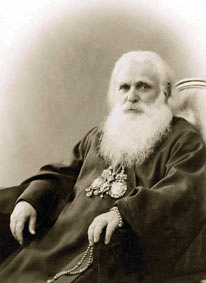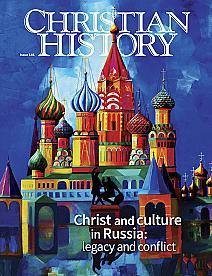AMBROSIUS OF GEORGIA OPPOSED COMMUNISM AND PAID A COSTLY PRICE

[Ambrosius of Georgia in the 1920s—Kober / public domain, Wikimedia File:Ambrosius I..jpg]
BESARION KHELAIA, known as Ambrosius, became Catholicos-Patriarch of all Georgia in 1921, during one of its many difficult times. A small nation on the east of the Black Sea, it borders Russia, Turkey, Armenia, and Azerbaijan. In recent centuries, it has struggled against Muslim invaders, Russian autocrats, and the Bolsheviks.
Although Georgia claims ties to several of the apostles, its national conversion to Orthodox Christianity came in 317 under the preaching of a young woman, Nino of Cappadocia. From the fifth century until the nineteenth it had an autocephalous church, that is, an independent church with its own Catholicos or Metropolitan. In the eleventh century, the Catholicos became patriarch of all Georgia. However, the Catholicos lost that distinction when military difficulties late in the eighteenth century caused Georgia to turn for assistance to Orthodox Russia. A few years later, in 1811 the Russians seized control of the Georgian national church.
From 1793 until 1917, Russia plundered and oppressed Georgia. During the early, troubled years of the Soviet regime, Georgia declared its independence and reclaimed its autocephaly—its independent patriarchy. European powers quickly recognized the nation. Georgia’s independence lasted little more than three years. Then the Soviets invaded and resumed the control the Czars had exercised over both church and state.
Shortly after that invasion, the Georgian church chose Ambrosius as its patriarch. A historian of his people and of their faith, he was a staunch opponent of Soviet communism. In 1922, he wrote a letter to the Genoa Conference which was trying to resolve diplomatic and economic issues that had arisen since World War I. Because Georgia had been admitted as a member of the League of Nations, Georgians hoped the conference would remedy their plight. However, the League only expressed sympathy.
The Bolsheviks, furious with Ambrosius’s action, arrested him, confiscated the patriarchal residence, destroyed churches, and looted religious property. They exiled or killed many clergy. Their crackdown led to popular riots in 1924. The Soviets responded by killing twelve thousand Georgians and exiling twenty thousand more. Blaming Ambrosius for stirring up the troubles, they sentenced him to eight years of hard labor. At his trial he stated, “My soul belongs to God, my heart to my motherland, and with my flesh you may do whatever you wish.”
Through the intervention of Bolshevik leader Mikhail Kalinin, Ambrosius and some other clergy were released in 1926. Worn out from captivity, Ambrosius died on this day 29 March 1927 in Tbilisi, Georgia. Twenty-eight years later, the Holy Synod of the Orthodox Church in Georgia declared Ambrosius a saint. He is now known as St Ambrose the Confessor.
—Dan Graves
----- ----- -----
For in-depth background on the situation in greater Russia at the time of Ambrosius, consult Christian History #146, Christ and Culture in Russia






